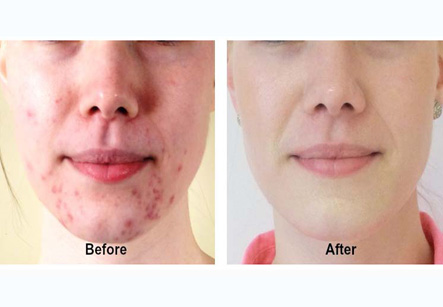Acne
Introduction
Acne is a dermatological condition that causes pimples and includes whiteheads, blackheads, red, inflamed patches as well as pus filled vesicles on the skin.
Acne occurs when tiny holes also called as pores on the surface of the skin become blocked. Each pore on the skin as connected to a hair follicle and an oil secreting gland. This gland releases oil which causes removal of dead skin cells. When a gland produces excess oil, then the pore is blocked. Dead cells, bacteria and dirt accumulate on it. This block is called as plug or come done. Depending on the color of surface of the plug, it can be whitehead or blackhead. When the plug erupts, redness and swelling appears. Pus may form in this plug. When the plug is deep inside the skin, it forms hard, painful cysts and this is called cystic acne.
Causes and incidence:
Acne is most common in teenagers because the hormonal changes cause skin to release more oil. They can occur rarely in babies also. Sometimes, acne tends to run in families.
We have all the information you need about public and private Cosmetic / Plastic clinics that provide Acne Treatment in Iran, Islamic Republic Of

Acne may be triggered by:
1. Oily cosmetic and hair care products
2. Drugs like steroids, testosterone, estrogen or phenytoin
3. Hormonal disturbances during puberty, menstrual periods, pregnancy, contraceptive therapy or stress.
4. Climatic humidity and excessive sweating.
Symptoms:
Acne commonly appears on the face and shoulders, but it may be distributed on the trunk, arms, legs, and buttocks.
Skin features:
1. Whiteheads
2. Blackheads
3. Cystic lesions
4. Red bumps or papules
5. Pus filled plugs or pustules
6. Crusting of the lesions
7. Skin redness
8. Scarring of skin
Diagnosis:
The diagnosis of acne is done by the dermatologist with the help of inspection of the lesions. No test is required.
Treatment:
• Self care:
1. Wash the face with a mild, moisture maintaining soaps. Cleanse all the make up or dirt on the skin. Wash the skin once or twice daily. But harsh rubbing and excessive washing should be avoided.
2. Oily type of hair should be washed daily with a shampoo. Comb the hair out of the face.
3. A small amount of sun exposure can improve the acne but excessive exposure should be avoided.
4. Removing, rubbing and picking the pimples should be avoided. It can lead to skin infection and scarring.
5. Wearing caps, hats or tight headbands continuously should be avoided.
6. Avoid touching the face repeatedly. It spreads the acne.
7. Avoid oily creams and cosmetics.
• Over the counter medications:
These are used when self-care doesn’t help. They can be medications containing benzoyl peroxide, sulfur, or salicylic acid. These drugs kill the bacteria, dry up the skin and help in removing the dead cells. But redness or peeling can occur due to them.
• Prescription medicines:
If pimples are still a problem, doctor can prescribe stronger medications.
1. Antibiotics- they may help some people with acne. Oral antibiotics like tetracycline, doxycycline, minocycline, erythromycin, trimethoprim, and amoxicillin can be useful. Also, topical antibiotics (applied to the skin) such as clindamycin, erythromycin, or dapsone are available for acne.
2. Creams or gels containing retinoic acid or azelaic acid.
3. For women with hormonal problems, spironolactone tablets can reduce the acne. Birth control pills also help in some cases rarely.
4. For People who have cystic acne and scarring a strong medicine called as isotretinoin can be prescribed. Side effects should be closely monitored during this treatment. Also, this drug should be strictly avoided in pregnant women as it causes severe birth defects.
• Minor procedures can also be done in severe cases. These are-
1. Laser photodynamic therapy
2. Chemical skin peeling
3. Dermabrasion for removal of scars
4. Drainage of cysts
5. Injection of cysts with cortisone
Prognosis:
Acne generally goes away after the teenage years, but sometimes it may continue even into middle age. The pimples may respond to therapy in about 6 to 8 weeks but can exacerbate from time to time. Without treatment, scarring may occur and can cause depression especially in teenagers.